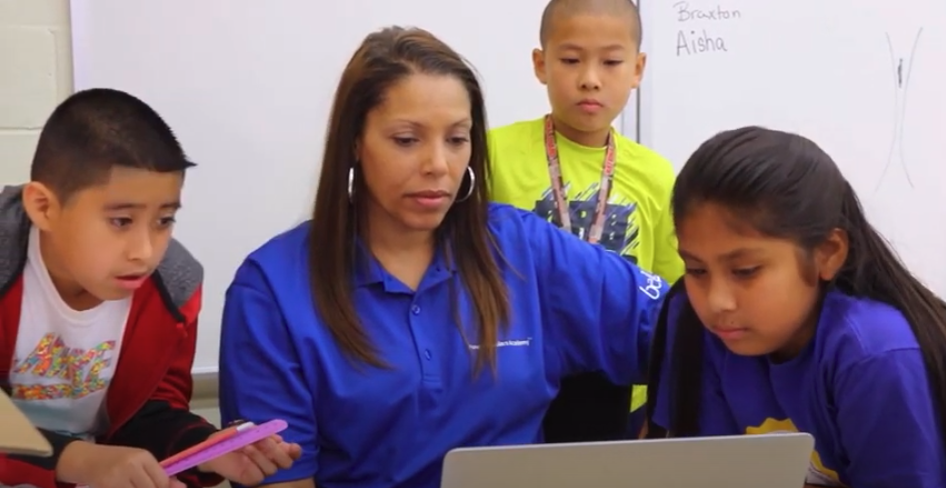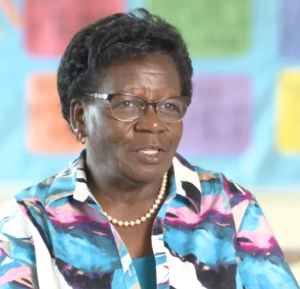Investment Leads to Impact in Washington, D.C.

It’s a bustling summer morning outside of Seaton Elementary School in the historic Shaw neighborhood of Washington, D.C. Eager children, led by their parents, stream into the school. They come from different age groups, races and backgrounds, but they share something in common. The children, enrolled in the YMCA of Metropolitan Washington’s school-based Power Scholar Academy (PSA), are all excited to learn.
As the K-6 scholars kick off their day, they are greeted with a familiar, endearing smile. “Good morning Ms. Janice!” the scholars exclaim one by one, as they greet Janice Williams in the lobby. With smiles radiating from ear to ear, the enrolled students, known as scholars, then embark on a full day of learning and enrichment at the Y’s summer learning program, powered by BellXcel.
Since 2013, the evidence-based summer program has empowered thousands of children through a holistic learning experience that has boosted scholars’ academic and social-emotional skills, as well as their self-confidence.
“Every day is a day where you’ll find scholars running to the program because they are excited about what they gain,” says Williams, YMCA of Metropolitan’s Senior Vice President for Program Development.
For her local community, Williams is more than a nonprofit administrator. She is a tireless and passionate supporter of expanding afterschool and summer learning for children from under-resourced communities. She has been with the YMCA for nearly 45 years, and with PSA since its inception. “Many of our schools that are in under-resourced communities don’t have the opportunity to meet the needs of all of the students that they have identified as struggling students,” she says. “We’re able to identify the particular area of challenge for scholars, and really put the resources in place to guide them to be more successful.”
 “We have been so fortunate to have BellXcel’s support in Washington, D.C. Before, there were camp programs. There was summer school. But there was something missing,” Williams said. “PSA is among the best programs out there because it not only provides opportunity for academic support, it also provides opportunities for scholars to learn new things through enrichment. It’s supported by committed educators who want to be a part of a program that allows them to connect and provide young people with the social-emotional learning that is critically needed.”
“We have been so fortunate to have BellXcel’s support in Washington, D.C. Before, there were camp programs. There was summer school. But there was something missing,” Williams said. “PSA is among the best programs out there because it not only provides opportunity for academic support, it also provides opportunities for scholars to learn new things through enrichment. It’s supported by committed educators who want to be a part of a program that allows them to connect and provide young people with the social-emotional learning that is critically needed.”
With an educator to scholar ratio of 2 to 24, William says the program’s small group environments are a key differentiator. In each classroom, a certified teacher and teaching assistant lead individual, small group, and whole group exercises, in dynamic learning environments. With the utilization of instructional coaches and other support staff rotating, it is not uncommon to see upwards of three to four educators in a classroom, all working together to provide an exceptional high-touch learning experience.
“This kind of learning style really does impact our ability to provide them with the necessary support to thrive,” Williams says. “There is a high value in that child-centered learning. We are also excited about the peer-to-peer learning that the program supports and empowers.”
PSA also empowered educators with 21st century instructional skills and strategies they can transmit into the classroom in the school year. Among teachers surveyed, 87 percent said site leaders were highly supportive of educators; 89 percent said teaching in PSA was rewarding, while 80 percent of teachers want to work with the program again.
“We are pretty fortunate to be able to have scholars that are receiving something during the course of the summer, as well as educators, who apply their learnings into the classroom in the fall,” says Williams. “The partnership is critical because BellXcel allows the YMCA to present itself to the community with a stamp of excellence. They bring the kind of skills and resources that are going to enhance the school community and allow it to reach the level and the goals that the school has in mind.”
Williams says the demand for evidence-based summer learning programs in her community remains high, and advocates for continued support. “I would truly invite any funder to go and visit a site. It is truly something that you have to witness to be able to see what the scholars are receiving and the type of investment that is being made, and having scholars learn, thrive, and really the impact on not only the summer learning, but the true impact that it allows, and the potential of each and every scholar to succeed and excel.”

